
When I tell people I have bees around me they usually assume they are Honey bees. Though at the moment I mostly have Solitary bees visiting my property. There are over 542 species of bee listed in Georgia, but I can only recognize a few of them.
Below is a list of all native bees in the state I live in.
Next year I will have Honey bees, I will do another post on what kind they are and talk about them in more detail. This post is going to be about the Solitary bees that visit where I live.
What is a Solitary bee?
Their are two major types of bees, colony based and solitary. Honey bees are colony based and build homes in the tens of thousands. Solitary bees are as the name states, by themselves. Each one of them does all the work themselves and do not depend on a colony to reproduce.
How are Solitary bees different from Honey bees?
Solitary bees will only travel about three hundred feet from their homes they are building. Honey bees will travel many miles to find nectar and pollen.
Every female Solitary bee is a queen, unlike Honey bees were there are many kinds of female bees but mostly are not queens. Due to Solitary bees all being queens, they are less likely to sting you as if they do they will die and their lineage would be ended.
Solitary bees do not make honey, but they do collect pollen. Research has shown Solitary bees are more efficient pollinators than Honey bees. Eventhough Honey bees have special organs to collect pollen called pollen sacs, Solitary bees do not have these. So they must cover their entire body in pollen to bring it back and then shake it off in their home.
Honey bees live much longer than Solitary bees. You can see Honey bees active from the end of frost all the way to the start of the next frost. But with some Solitary bees such as Mason bees, the females will only live for about three to four months. The male Mason bees only live for a few weeks.
What kinds of Solitary Bees do I have visiting where I live?
Red Mason bee (Osmia bicornis)
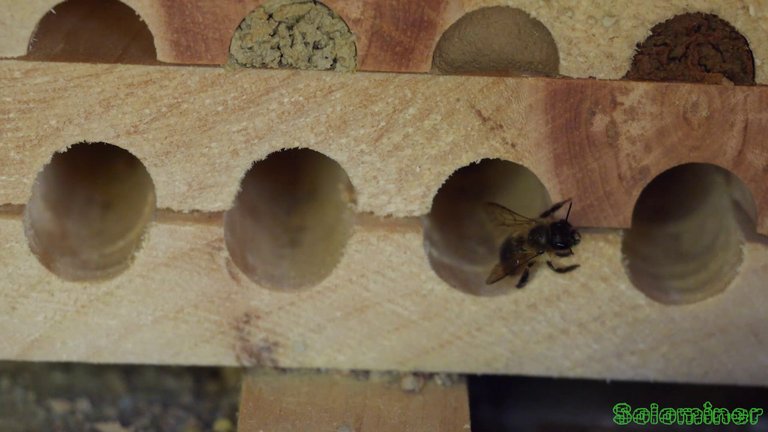
As far as I know, I have the Red Mason bees that uses the bee boards. I see some with yellow fuzzy butts and some with plain black butts. The males have a white spot on their face and the females are larger and have a yellowish red color to their hairs on their body. These are the bees that use mud to build their homes, and then larva inside grow into bees over many months inside these mudded over tunnels. Sometimes I think I may have Leafcutter bees as well (Megachile lagopoda) but I have never found any cut leaves inside the homes so possibly not.
Sculptured resin bee (Megachile sculpturalis)
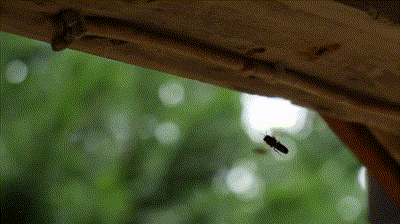
These Solitary bees show up a few months later after the Mason bees are done for the year, though they do not seem to prefer the homes that the Mason bees use. Instead these Sculptured resin bees make use of Carpenter bee homes. They will chase off the larger bee and then lay their own larva inside of these holes the Carpenter bees worked hard on making. I see them for a few weeks and then they are gone.
A link to a video I made with a few using old Carpenter bee homes.
https://peakd.com/hive-123046/@solominer/resin-bees-making-use-of-old-carpenter-bee-homes
Eastern Carpenter bee (Xylocopa virginica)
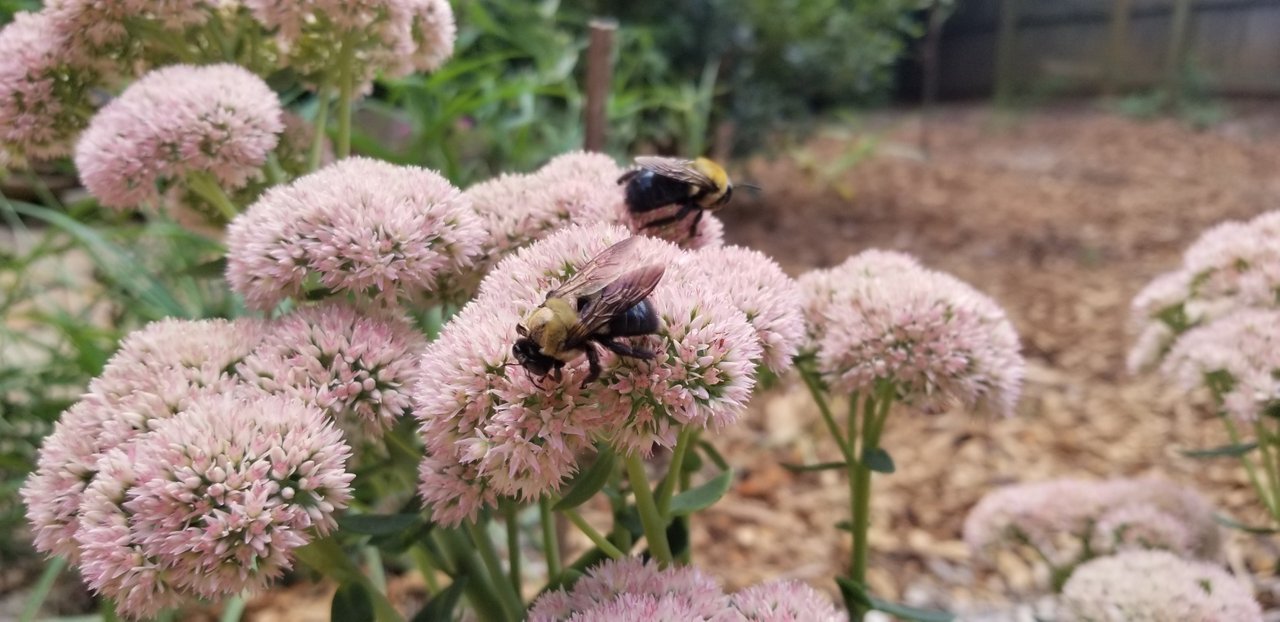
I consider these bees mild pests, they build homes by eating away at wood and drilling inside. They get their name by how they work the wood and borrow inside to lay their larva. They will destroy wood and its something I am not a big fan of. Though besides that destructive trait, they are pollinators as well. Though they do tend to rob the flowers meaning they will damage the flower getting to the pollen. So I prefer other kinds of bees to do the pollinating.
https://peakd.com/@solominer/carpenter-bees-feeding-on-sedum-flowers
Ashy Mining bee (Andrena cineraria)
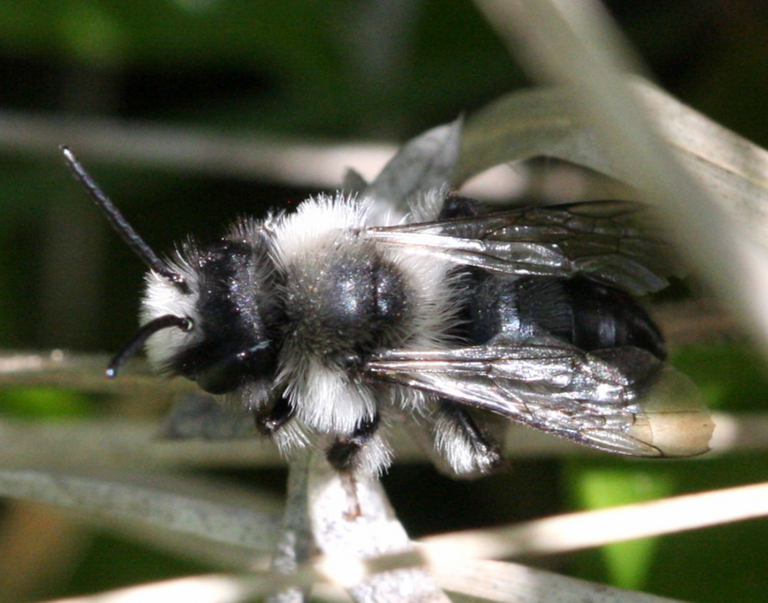
I have seen this bee once, it was just like my Mason bees but a little smaller and had gray fur. Its pretty rare but I would like to encourage more borrowing bees. In the future I may build some homes just for those kind of bees. As they have different needs than the Mason bees.
Sweat bee (Lasioglossum)
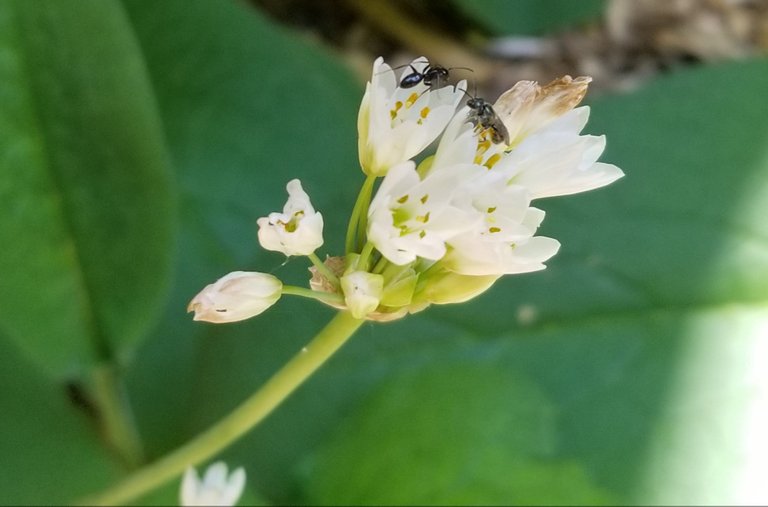
These are very small compared to most bees, maybe half the size. In the picture above I took it with an ant next to the bee. The black ant is about the same size as the little Sweat bee. My friend @ibt had one land on him and feed on his sweat once. I have not had such an experience but sounds like that is where they get their name from.
I will make another post when I find more bees I have IDed. I would love to know if anyone else has the same kind of bees where they live. If you have photos please share, I would love to see the bees in other regions.
Addresses below to help me buy better camera equipment and support me to travel to locations to do photo and video and overall great blogs in new places.
| Coin | Address |
|---|---|
 BTC: BTC: | bc1qhfmvd2gywg4fvrgy2kkkkyqta0g86whkt7j8r7 |
 LTC: LTC: | ltc1qdyzm5cwgt8e2373prx67yye6y9ewk0l8jf3ys9 |
 DASH: DASH: | XkSqR5DxQL3wy4kNbjqDbgbMYNih3a7ZcM |
 ETH: ETH: | 0x045f409dAe14338669730078201888636B047DC3 |
 DOGE: DOGE: | DSoekC21AKSZHAcV9vqR8yYefrh8XcX92Z |
 ZEN: ZEN: | znW9mh62WDSCeBXxnVLCETMx59Ho446HJgq |
If you didn't write about it, I wouldn't have known. I use to feel all bees are honey bees, wow. So are there like any specific kinds of bees too that doesn't sting since not all bees are honey bees?
Hah yup.. there are many kinds. Not all honey bees.
They do all sting, but some are less likely than others.
Congratulations @solominer! You have completed the following achievement on the Hive blockchain and have been rewarded with new badge(s) :
You can view your badges on your board and compare yourself to others in the Ranking
If you no longer want to receive notifications, reply to this comment with the word
STOPDo not miss the last post from @hivebuzz:
A great post here about the Bee kingdom
We appreciate your work and your post was manually curated by @papilloncharity from the DNA team!
Reach us on Discord to learn more about the project!